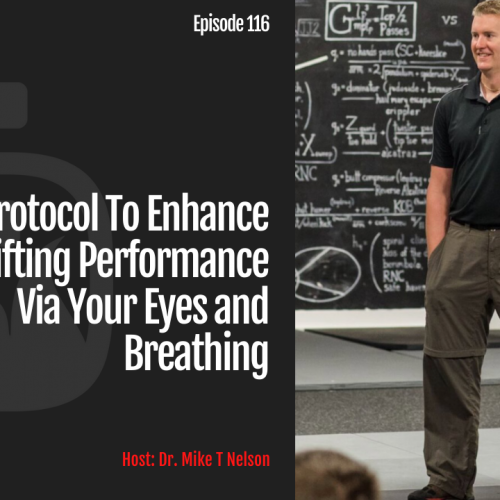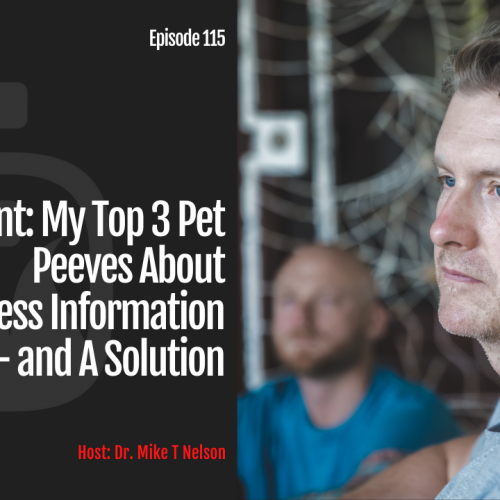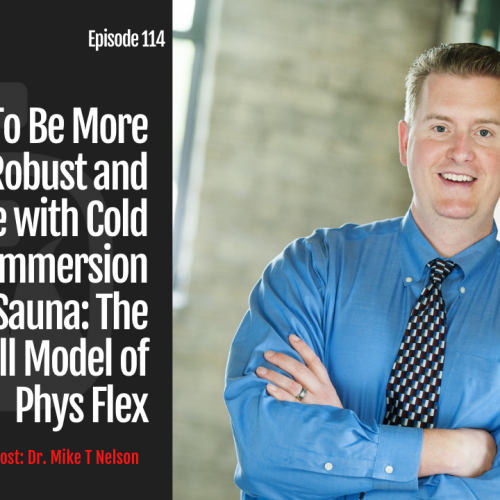Today’s tip revolves around the concept of holding a paradox specific to lifting. This means you can accept where you are with a certain lift without judgment while also continuing to work on getting better.
Episode Notes
- Being “happy” with current performance while also being realistic as to how that compares on a national or world scale
- Comparison to others’ highlight reels de-incentivizes your brain toward getting better
- Look up standards for your particular lift to get an idea of the direction you need to go
- Work on holding the paradox of “This is where I’m at now” and “Can I do better than before”
This podcast is brought to you by The Flex Diet Cert. Get on the daily newsletter to also secure your spot for the next round at www.flexdiet.com.
S2_EP_18: Holding Paradox: The Key to Reaching Your Fitness Goals
Or watch on YouTube:
Rock On!
Dr Mike
P.S. Catch up on any missed Flex Diet Podcasts!
Transcript
Dr. Mike T Nelson (00:00):
Hey, it’s dr. Mike T. Nelson here with the flux diet podcast. Welcome back again. And today it’s just to me, the short little tip brought to you by of course, the flex, the diet go to flex diet.com F L E X, D I E t.com. And you’ll be able to get onto the daily newsletter that has all sorts of cool info, right to your inbox. And then you’ll also be able to get on the wait list for the next time the flex diet certification opens up. So go to flux diet.com, F L E X, D I E t.com. And today’s tip is normally we talk more about nutrition and things. That’ll help you get increased body composition and the performance without sacrificing your health. And today’s tip is related to that, but it’s more on the lifting side. So the topic is revolves around the concept of holding a paradox.
Dr. Mike T Nelson (01:12):
And I like this quote here, the test of a first rate intelligence is the ability to hold two opposed ideas in mind at the same time, and still retain the ability to function. This was from F Scott Fitzgerald back in 1936. And you’re probably wondering how the heck does that have to relate to lifting performance. And I think it goes back to the concept of realizing where you are currently at, let’s say with one particular lift and being realistic with that, but also not making yourself feel bad for the current level of performance you are at, right? The old quote satisfaction is a death of desire. There’s some truth to that, but I think it’s a little bit more complicated also. So now, as I was, I posted this on social media the other day, we’re kind of comparing ourselves all the time to everyone’s highlight reel, and it becomes very easy to think that whatever you’re doing for say your lift we’ll use for this example, the bench for us is not really good enough because now you have access to all sorts of world record lifts at the tip of your fingertips.
Dr. Mike T Nelson (02:43):
However, if you go to most gyms, you’ll see something that’s completely different than what you find on the internet. I would even argue that if you are benching two 25 for a single, then most gyms, you’re probably ahead of most people there. No, of course there are exceptions to this and gyms will vary. And if you’re at a very hardcore power lifting gym, that is a, you’re probably at the bottom of the totem pole there, so to speak, but it all depends upon your frame of reference. I would also argue that in comparing yourself to everybody else’s highlight it is not doing yourself any justice either. So holding paradox would be being happy. So in quotes with your current performance, giving yourself the win, when you get performance, that is better than what you did before, but also at the same time being realistic of how that compares on maybe a national or a world scale.
Dr. Mike T Nelson (03:57):
I think it’s very easy to look at everyone’s highlight reel, and then just submiss the work that you had done in the gym to get better. I don’t think that is the best way to make progress, right? And you’re literally kind of de incentivizing your brain for doing the better on the flip side. Some people not probably too many listening to this podcast can have a very inflated idea of their lifts and how they actually compare. I would say, I don’t really see that too much anymore. I do see some people who still think they can do X lift because they did it when they were 19. And that was like two decades ago. That’s probably maybe just poor memory or just the anchoring of that getting stuck in your brain. So how to make this practical is you can look up what are standards for, let’s say you’re doing power lifting, or I do a fair amount of rowing.
Dr. Mike T Nelson (05:02):
You can look up standards for that. You can look up standards for CrossFit. It’s very easy to find any standards for whatever lifting you are doing right now. So that gives you an idea of the direction to go. And if you want to be competitive in that say at a national or a world level gives you an idea of where you would need to be. Now, if you don’t want to be extremely competitive, those numbers probably don’t really matter much at all. And then you have the micro level, which is where your lifts are currently at. These would be your current PRS personal records. I also do like tracking volume and density PRS. So volume is obviously just the amount of work that was done. Your weight times, your reps, times your sets. We’ll give you your volume density is now we’re adding a factor of time.
Dr. Mike T Nelson (06:01):
We take our volume divided by the time now it gives us our density. So for my main lifts that I’m trying to improve, I will track my one. RM I will track the volume of work that I’ve done, and I will also track density. Now for some of them, I may get really hyper-specific and at a certain weight, I may also track volume or density. Most people probably don’t have to worry about that. If it’s a lift that I’m trying to be competitive in. So say with Rowan, one of my main goals with that, it can go to the concept to site. I can find people in my weight category. So I’m in the heavy weight and my age category and how people rank overall to that who do Rowan and report on the site. So my main goal, which has been for the last couple of years is to hit the 75th percentile on the concept to board for the 500 meter row, the two K and the 5,000 or the 5k.
Dr. Mike T Nelson (07:07):
I’m getting pretty close to that. I did a 1000 meter the other day, which is obviously half of a two K and I’m at the 50th percentile with that. And then the two K I’m right at about 50 percentile, five cam, right at about 50th percentile, which is much better than when I started. Some of them were literally in the bottom 10 to 12%. So definitely getting better. And granted, this has taken, you know, several years at this point. Some people may take you less. Other people I’ve tested are already at 75th percentile and don’t do a lot of roommates. So it’s going to vary. You can do the same thing with lifting and whatever you want to monitor. This gives you an idea of what are the goals you want to achieve and how this breaks down then is that gives me direction of where I want to go and how close I’m getting individual PRS along the way, give me markers or kind of roadmaps and kind of stop off points along the way in the past.
Dr. Mike T Nelson (08:18):
It’s very easy. And I know I fell into this trap of seeing a world record a lift and realizing that, Oh, wow. Yeah, my squad does even not as good as my bench press, right? To get kind of demoralized by how low you are at, but making yourself feel bad about a lift, isn’t going to increase its performance. So you are going to work on, I have to still remind myself of this. Sometimes of holding the paradox of can I do better than I ever had then before on the micro level, that is going to be my progress. And if you’re not competitive, that’s probably all that really matters. If it’s something that I’m trying to be competitive in the macro version is kind of where everybody else is at. And the key, even with high level athletes is if you continually get better than where you were before you were going to get closer to whatever your goal is.
Dr. Mike T Nelson (09:25):
So the holding paradox is the realistic of where your lifts are at, but also giving yourself credit when you get a PR and then moving forward from that, if you are very far away from your goal in the future, which may be a couple of years to maybe decade or longer, it’s very easy to kind of dismiss these small incremental progress that you make. But the reality is most of the progress you’re going to make is small and incremental. When you start out, everything is going to go well, you’re going to make pretty big gains, but that is going to slow to a crawl for vast majority of people. Very, very soon. Otherwise you’d walk into almost any gym and people would be bench pressing 400 pounds all the time. How did they get there? Just adding five pounds to the bar. Every time they went in the gym, but we know the physiology is not linear and it doesn’t work that way.
Dr. Mike T Nelson (10:27):
So today’s take away of holding. Paradox is taking to the micro level and working over time to do better than what you have done before. You can even break it down into one RM or a three RM or a five RM, right? So five rep max or volume PRS or density PRS. So for example, today I hit a one 85 on the bench press for eight reps. So I was pretty happy with that. Now, is that competitive in any sense of the imagination on even a state level? No, not at all, but my main goal is actually not bench press. I’m happy that I’ve made progress in doing it that most of the progress I’ve made is I don’t have pain when I’d been trusted now, which is great. And since I’ve been at home using my home gym, I haven’t been to a commercial gym mood boy since February, I’ve only had access to a straight bar and a neutral bar.
Dr. Mike T Nelson (11:30):
So I’ve gotten a lot more practice doing that, which has obviously paid off in terms of doing better. So again, that is easy for me to look and go well, that’s not really that, that competitive and kind of not really giving myself the win for doing better than what I did before. The reality is since I am not choosing to be competitive in a Ben trust if you want to do that, that’s great. That’s not my particular goal. I just like playing around with the lift. So I think it’s a good compound lift and I can do it now without pain. So in that case, my only goal is just doing better than what I have done before. If there’s something like a romaine or grip things or Denny stones that I’m working on, those have different end points. Because that is something that I want to achieve in the future.
Dr. Mike T Nelson (12:25):
That is more a percentage of what the highest level performance is. So the summary you can hold your paradox of giving yourself the win for incremental progress that you make in the gym. And at the same time, realizing that whatever that number is may not be highly competitive on a national state or world level. The trap that you want to avoid falling into is just missing progress that you’ve made, because it doesn’t stack up to somebody else’s highlight reel or comparing yourself to the 0.0, zero 1% of the world. So that’s today’s podcast. Hope you enjoyed it. Give me any feedback you have. I was just something that I was spending a lot of time thinking about lately and how it compares and works with lifting. You can take this exact same concept and apply it to nutrition. You can also apply it to many other areas, such as politics, but we are not going to go there for now. So thank you so much for listening. If you’re interested in the flux diet certification, let we take eight interventions based on physiology and we rank them. And we also include the psychology portion, which is kind of what we’re talking about today. Go to flex diet.com, F L E X, N D I E t.com. You’ll be able to get onto the newsletter list there, and the next time you certification opens up and you will be the first one to be notified. So thank you so much greatly. Appreciate it. Have a good day.





